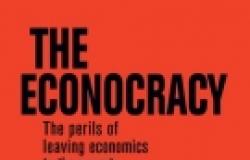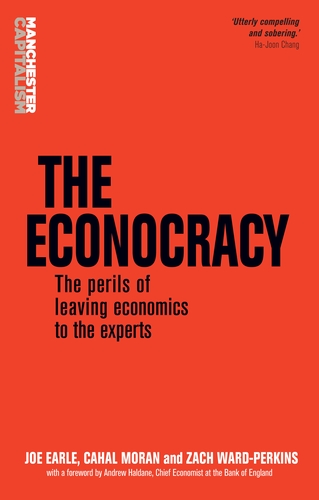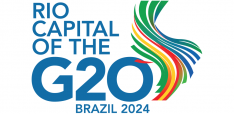Book Review - The Econocracy: The Perils of Leaving Economics to the Experts

The Econocracy: The Perils of Leaving Economics to the Experts. Joe Earle, Cahal Moran and Zach Ward-Perkins. Manchester University Press. 2016.
In The Econocracy: The Perils of Leaving Economics to the Experts, Joe Earle, Cahal Moran and Zach Ward-Perkins argue that the logic of economics has come to shape how political issues are framed and addressed, leading to a deep divide between economics ‘experts’ and the majority of citizens who have grown increasingly suspicious of the discipline. This concise and well-researched book is a timely critique of the state of economics today and may empower ‘citizen economists’ to become part of the debate, writes Maxine Montaigne.
If the authors of this book hope to start a dialogue on the current state of economic debate in the UK, their success can at least partly be measured by the impressive range of thinkers whose praise fills its front pages. Written by the founding members of the Post-Crash Economics Society at the University of Manchester, this slim book manages to pack in a concise and well-researched critique of modern economics and how it is taught in universities as well as the broader issue of public engagement with economics as part of the democratic process. Written in the wake of the Brexit referendum but before the surprising success of Donald Trump, this book is a timely warning of what can happen when economists, policymakers and the public can’t find common ground.
The authors describe the ‘Econocracy’ as ‘a society in which political goals are defined in terms of their effect on the economy, which is believed to be a distinct system with its own logic that requires experts to manage it’ (7). Since the financial crisis of 2008, there has been no end of books and articles decrying the so-called ‘crisis in economics’, mostly based on a narrative (whether fair or not) that economists failed to predict the crisis, and more recently a sense that the subsequent economic response in the form of austerity policies has done more harm than good. Is it any wonder then, the book asks, that the public might be left questioning economic ‘experts’, and economics students their education?
The Post-Crash Economics Society has its origins in this disenchantment, and one of the book’s strongest contributions is its critique of the highly stylised and homogenised curriculum that would be familiar to economics students worldwide. The authors contend that despite attracting capable students who are interested in the world around them, economics as it is taught at university has little to do with the real world, uncritically setting out a model based on rational individuals and an economic system that tends towards equilibrium, while also being insufficiently pluralist, downplaying debate between different schools of economics or relegating these to the History of Economics.
 This argument is supported by a useful analysis of the final exam questions on core and elective economics courses at various universities. These rely heavily on what the authors call ‘operate the model’ problems: asking students to uncritically apply the taught model to a stylised situation, with no thought to whether the model, situation or answers are realistic or useful. Overall this analysis finds that 76 per cent of exam questions required no ‘critical or independent thinking whatsoever’ (51). Even if exams aren’t perfectly representative of course content, they will very much influence student efforts, so it is concerning that critical engagement is neither valued nor rewarded. The authors lament: ‘It is hardly an exaggeration to say that it is now possible to go through an economics degree without once having to venture an opinion’ (51).
This argument is supported by a useful analysis of the final exam questions on core and elective economics courses at various universities. These rely heavily on what the authors call ‘operate the model’ problems: asking students to uncritically apply the taught model to a stylised situation, with no thought to whether the model, situation or answers are realistic or useful. Overall this analysis finds that 76 per cent of exam questions required no ‘critical or independent thinking whatsoever’ (51). Even if exams aren’t perfectly representative of course content, they will very much influence student efforts, so it is concerning that critical engagement is neither valued nor rewarded. The authors lament: ‘It is hardly an exaggeration to say that it is now possible to go through an economics degree without once having to venture an opinion’ (51).
This disheartening state of affairs is blamed on a combination of factors that come under the umbrella of ‘Econocracy’: the increasing marginalisation of heterodox thought from the discipline, for example, starting with the kinds of articles that are accepted into the major journals. This, in turn, influences what research is prioritised by universities and funding bodies (currently through the Research Excellence Framework), and inevitably who is hired or promoted (the ‘curse of the top five’ journals was discussed at this year’s American Economic Association meeting). This is compounded by the increasing financial pressures facing the Higher Education sector, with reduced funding per student leading to ever-larger class sizes and time-poor lecturers and graduate teaching assistants.
That universities in Britain have been suffering the effects of this ‘economic rationalism’ for the past few decades is not news. Stefan Collini, for instance, has long spoken out against the worsening outcomes not just for students of the modern university, but society more broadly. Although it is beyond the scope of this book, it would have been interesting to get a sense of whether economics has suffered disproportionately compared to other courses. The authors do note that economics degrees are seen by many universities as a particularly useful money-maker (used to cross-subsidise other departments), being most compatible with large lectures and exams relying on stock answers and multiple-choice questions. In spite of this, the authors observe that a growing number of universities are dropping their economics degrees completely, which is a worrying trend if decreasing public engagement with economics is to be addressed.
The authors have clearly dedicated a lot of thought to the question of how to improve university economics and do offer some concrete suggestions, which mainly revolve around a more engaged style of pedagogy (for example, peer-to-peer teaching and alternative forms of assessment). In fact, one of the most interesting contributions of this book is its account in Chapter Four of the authors’ experience lobbying their own university for reform, making this a valuable case study in campaigning and network-building for similarly motivated readers. However, despite their tenacious optimism, even the authors have to admit that ‘reforming economics education to better serve its students, the discipline and society will be extremely difficult without a change of direction in university and government policy’ (140). Incremental change at the level of the curriculum can only do so much, but that doesn’t mean it shouldn’t be attempted (the book provides a good overview and critique of one such attempt, the CORE project).
But the broader problem of the ‘Econocracy’ beyond how economics is taught is surely the growing public disenchantment with the discipline. While much ink is yet to be spilt trying to explain the rise in populist movements worldwide, public engagement with economic debate is surely a key issue. The authors argue that while many of the factors associated with this new wave of anti-globalist sentiment are economic (including stagnant middle-class wages and the loss of blue-collar jobs), the rhetoric of these movements is decidedly non-economic, emphasising instead questions of national security and sovereignty. This is a crucial insight: that combatting the appealing messages of populism might not be a case of simply ‘winning’ the economic debate (the rhetoric around Brexit being a clear example of this failed strategy), but instead creating a new kind of discourse that addresses the concerns of a disengaged public and, more importantly, actively involves this public. The book concludes with a rousing call for a new kind of ‘citizen economist’ who can facilitate this engagement, decoding the ‘econobabble’ of economists and policymakers and empowering citizens to be part of the debate. Economics has for too long been seen as a set of tools for use only by the experts. But economics, as this book argues, is for the public, and they too can pick up these tools and decide how they want to use them.
Maxine Montaigne received a Master of Economics from the Australian National University and is now working towards an MPhil in the History of Economic Thought at the London School of Economics. Her research explores the way economic ideas and rhetoric were deployed within the various population controversies of the nineteenth century. More broadly, she is interested in the way politics, economics and social issues intersect in the public sphere. Read more by Maxine Montaigne. This post first appeared on the LSE's Politics blog.


